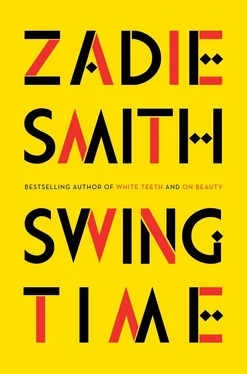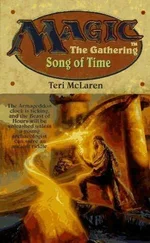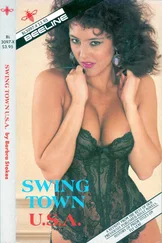We four stood in the lift, silent. I was determined to speak, but before I managed it Aimee turned to me and pouted at my top, like a pretty teenage boy in a sulk.
“Interesting choice,” she said, to Judy. “Wearing another artist’s shirt when you’re meeting an artist? Professional.”
I looked down at myself and blushed.
“Oh! No! Miss — I mean, Mrs. — Ms. Aimee. I wasn’t trying to make any—”
Judy let out a loud, single laugh, like a seal barking. I tried to say something else, but the lift doors opened and Aimee strode out.
To get to our various appointments we had to walk the halls, and they were lined with people, like the Mall during Diana’s funeral. Nobody seemed to be working. Whenever we stopped in a studio people lost their cool almost immediately, irrespective of their position in the company. I watched a Managing Director tell Aimee that a ballad of hers was the first dance at his wedding. I listened, excruciated, as Zoe launched into a rambling account of the personal resonance “Move with Me” had for her, how it had helped her become a woman, and understand the power of women, and not be afraid to be a woman, and so on. As we got away, finally, along another hall and into another lift, to make our way down to the basement — where Aimee had, to Zoe’s delight, agreed to record a brief interview — I worked up the courage to mention, in the world-weary way of twenty-two-year-olds, how dull I imagined it must be for her to hear people saying these sorts of things to her, day and night, night and day.
“As a matter of fact, Little Miss Green Goddess, I love it.”
“Oh, OK, I just thought—”
“You just thought I had contempt for my own people.”
“No! I just — I—”
“You know, just because you’re not one of my people doesn’t mean they’re not good people. Everybody’s got their tribe. Whose tribe are you in anyway?” She took a second, slow, assessing look at me, up and down. “Oh, right. This we already know.”
“You mean — musically?” I asked, and made the mistake of glancing over at Melanie Wu, in whose face I understood that the conversation should have ended many minutes earlier, should never have started.
Aimee sighed: “Sure.”
“Well… a lot of things… I guess I like a lot of the older stuff, like Billie Holiday? Or Sarah Vaughan. Bessie Smith. Nina. Real singers. I mean, not that — I mean, I feel like—”
“Um, correct me if I’m wrong,” said Judy, her own broad Aussie brogue untouched by the intervening decades. “The interview’s not actually happening in this lift? Thank you.”
We got out at the basement. I was mortified and tried to walk ahead of them all, but Aimee skipped in front of Judy and linked arms with me. I felt my heart rise in my throat, as the old songs tell you it can. I looked down — she’s only five foot two — and for the first time confronted that face close up, somehow both male and female, the eyes with their icy, gray, cat-like beauty, left for the rest of the world to color in. The palest Australian I ever saw. Sometimes, without her make-up on, she did not look like she was from a warm planet at all, and she took steps to keep it that way, protecting herself from the sun at all times. There was something alien about her, a person who belongs to a tribe of one. Almost without knowing it, I smiled. She smiled back.
“You were saying?” she said.
“Oh! I… I guess I feel like voices are — they’re sort of like—”
She sighed again, miming a glance at a non-existent watch.
“I think voices are like clothes,” I said firmly, as if it were an idea I’d been thinking about for years rather than something I was at that moment pulling from the air. “So if you see a photo of 1968 you know it’s ’68 from what the people are wearing, and if you hear Janis sing, you know it’s ’68. Her voice is a sign of the times. It’s like history or… something.”
Aimee lifted one devastating eyebrow: “I see.” She let go of my arm. “But my voice,” she said, with equal conviction, “my voice is this time. If it sounds to you like a computer, well, I’m sorry, but that’s just because it’s right on time . You might not like it, you might be living in the past, but I’m fucking singing this time, right now.”
“But I do like it!”
She made that funny adolescent pout again.
“Just not as much as Tribe. Or Lady-Fucking-Day.”
Judy jogged up to us: “Excuse me, do you know what studio we’re heading to, or do I have to—”
“Hey, Jude! I’m talking to the youth here!”
We’d reached the studio. I opened the door for them.
“Look, can I just say I think I really got off on the wrong — really, Miss — I mean, Aimee — I was ten when you first dropped — I bought the single. It’s mental for me that I’m meeting you. I’m one of your people!”
She smiled at me again: there was a kind of flirtation in the way she spoke to me, as there was in the way she spoke to everybody. She held my chin gently in her hand.
“Don’t believe you,” she said, took my fake nose ring out in one swift movement, and handed it to me.
Four
Now, there is Aimee, on Tracey’s wall — clear as day. She shared the space with Michael and Janet Jackson, Prince, Madonna, James Brown. Over the course of the summer she made her room into a kind of shrine to these people, her favorite dancers, decorated with many huge, glossy posters of them, all caught in mid-movement, so that her walls read like hieroglyphics, indecipherable to me but still clearly some form of message, constructed from gestures, bent elbows and legs, splayed fingers, pelvic thrusts. Disliking publicity shots, she chose stills from concerts we couldn’t afford to attend, the kind in which you could see the sweat on a dancer’s face. These, she argued, were “real.” My room was likewise a shrine to dance but I was stuck in fantasy, I went to the library and took out old seventies biographies of the great MGM and RKO idols, ripped out their corny headshots and stuck them up on my walls with Blu-tack. In this way I discovered the Nicholas Brothers, Fayard and Harold: a photo of them in mid-air, doing the splits, marked the entrance to my room, they were leaping over the doorway. I learned that they were self-taught, and though they danced like gods had no formal training at all. I took a kind of proprietorial pride in them, as if they were my brothers, as if we were family. I tried hard to interest Tracey — which of my brothers would she marry? which would she kiss? — but she couldn’t sit through even the briefest clip of black-and-white film any longer, everything about it bored her. It wasn’t “real”—too much had been subtracted, too much artificially shaped. She wanted to see a dancer on stage, sweating, real, not done up in top hat and tails. But elegance attracted me. I liked the way it hid pain.
One night I dreamed of the Cotton Club: Cab Calloway was there, and Harold and Fayard, and I stood on a podium with a lily behind my ear. In my dream we were all elegant and none of us knew pain, we had never graced the sad pages of the history books my mother bought for me, never been called ugly or stupid, never entered theaters by the back door, drunk from separate water fountains or taken our seats at the back of any bus. None of our people ever swung by their necks from a tree, or found themselves suddenly thrown overboard, shackled, in dark water — no, in my dream we were golden! No one was more beautiful or elegant than us, we were a blessed people, wherever you happened to find us, in Nairobi, Paris, Berlin, London, or tonight, in Harlem. But when the orchestra started up, and as my audience sat at their little tables with drinks in their hands, happy in themselves, waiting for me, their sister, to sing, I opened my mouth and no sound came out. I woke up to find I had wet the bed. I was eleven.
Читать дальше












